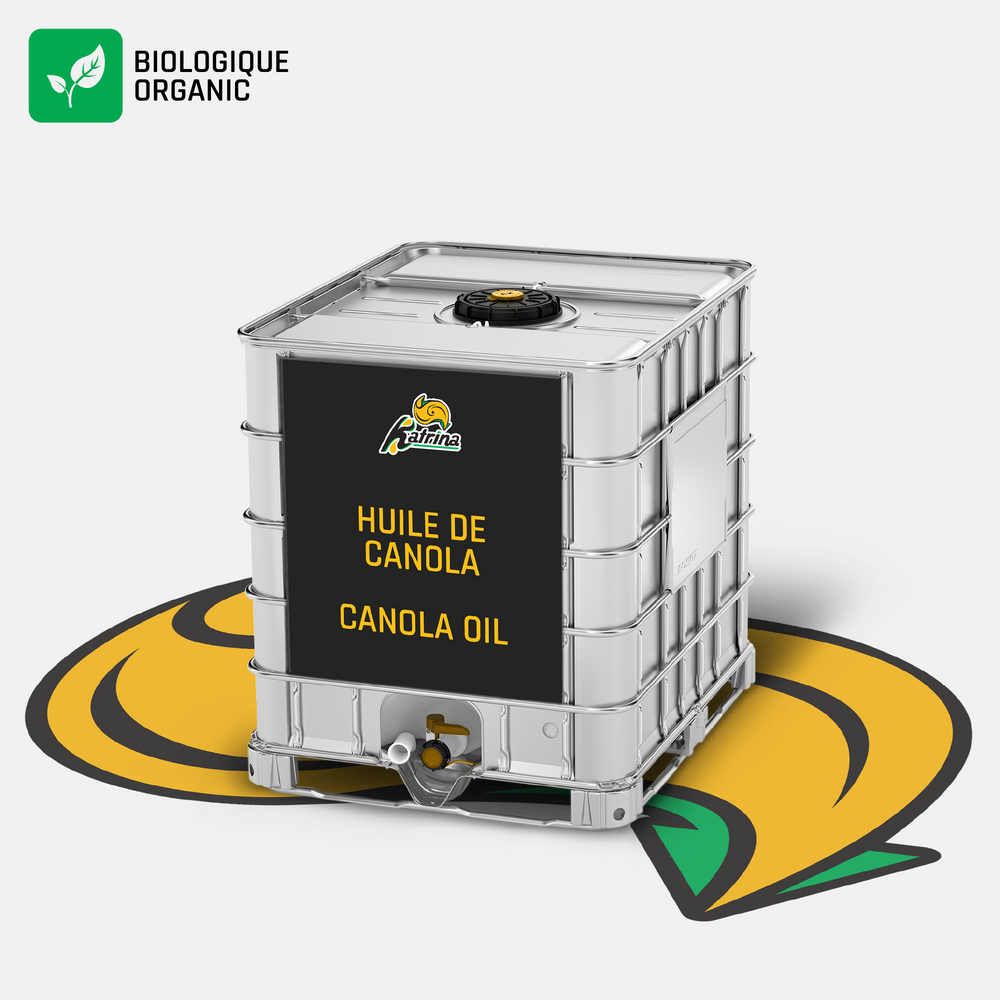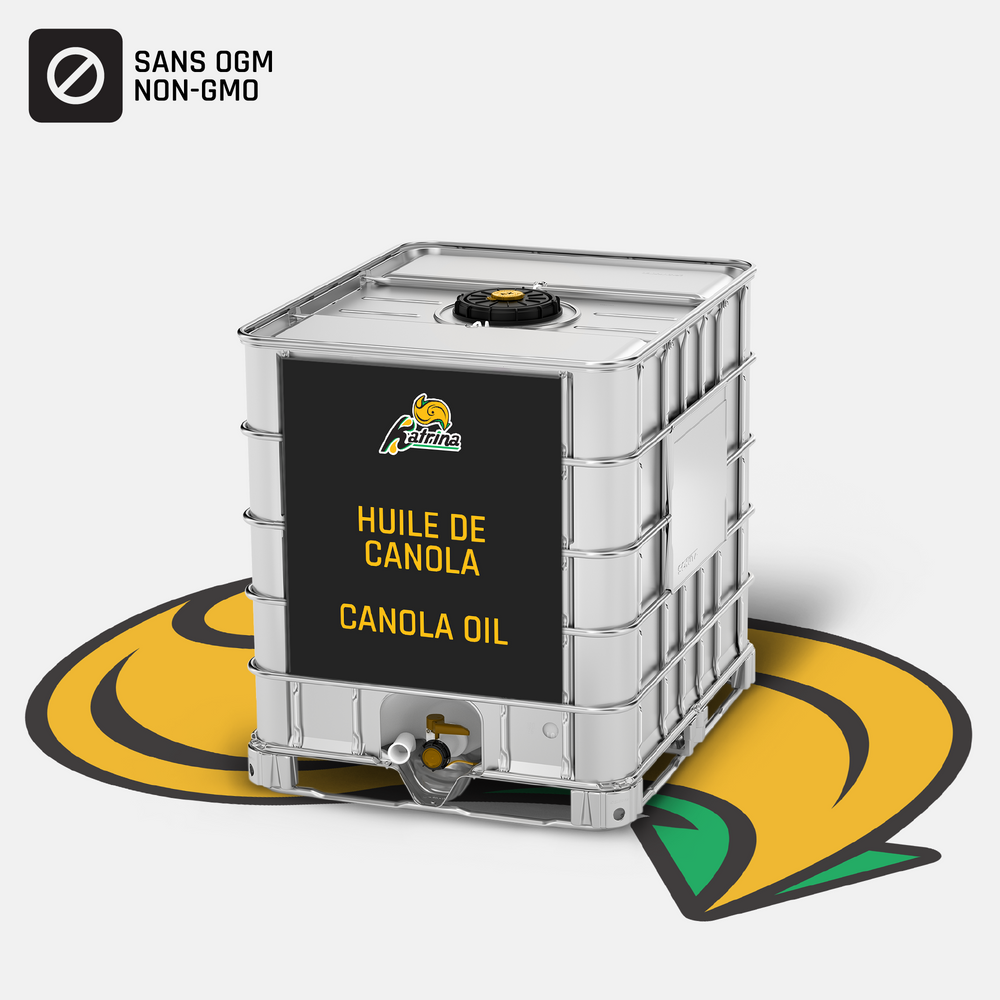Organic Canola Oil: Health Benefits and Facts
Organic canola oil has been gaining attention for its health benefits and natural production process. However, questions and misconceptions still surround this specific variety of canola oil.
In this article, we'll talk about its nutritional benefits, address common concerns, and explain why organic canola oil could be the healthier choice for your kitchen or business.
What Is Organic Canola Oil?
It's more than just a label—organic canola oil is made using natural, chemical-free methods in every step of the production process. It's made from non-GMO canola seeds grown without synthetic pesticides or fertilizers and can be either cold-pressed or expeller-pressed.
Cold-pressed organic canola oil is extracted through mechanical pressing at low temperatures. This method preserves most of the oil’s nutrients, flavour, and natural purity without the need for solvents or chemicals. Expeller-pressed organic canola oil also uses a mechanical press to extract oil, but the process generates slightly more heat.
Both methods produce high-quality oil, but cold-pressed organic canola oil is often considered the most nutrient-dense and minimally processed option.
Regardless of extraction method, canola oil producers must adhere to stringent certification standards to earn the coveted 'organic' label. These standards are regulated by organic certifying bodies to ensure that every drop of organic canola oil meets the criteria for purity and sustainability. Some organic certifications include:
- United States Department of Agriculture (USDA)
- Canadian Food Inspection Agency (CFIA)
- Organic Materials Review Institute (OMRI)
- Ecocert & Ecocert Canada
- Global Organic Alliance (GOA)
Is Organic Canola Oil Healthy?
Yes, organic canola oil is considered a healthy choice for cooking due to its low saturated fat content, high amount of heart-healthy monounsaturated fats, omega-3 fatty acids, and vitamin E.
The Health Benefits of Organic Canola Oil

1. Heart Health
The low saturated fat and high monounsaturated fat content in canola oil can help reduce bad cholesterol levels (LDL cholesterol) while maintaining or even increasing good cholesterol levels (HDL cholesterol). This can contribute to a healthier cardiovascular system.
2. Omega-3 Fatty Acids
The presence of ALA in canola oil provides a plant-based source of omega-3 fatty acids, which are associated with reducing the risk of heart disease and supporting overall health.
3. Antioxidant Protection
The vitamin E in canola oil offers antioxidant protection, helping to combat the damaging effects of free radicals in the body.
4. Versatility in Cooking
Organic canola oil's high smoke point and neutral flavour make it suitable for various cooking methods, from sautéing to baking. Using it as a replacement for less healthy fats can improve the overall nutritional quality of your meals.
5. Reduced Pesticide Exposure
Organic canola oil is produced from organically grown canola plants that adhere to strict organic farming practices, unlike regular canola oil. These practices include using synthetic pesticides and genetically modified organisms (GMOs) and prioritizing soil health and sustainability.
Important note: Like any cooking oil, organic canola oil should be used in moderation. While it's a healthy choice, excessive consumption of any oil can add unnecessary calories to your diet.
Related: Organic Canola Oil vs Regular Canola Oil
Culinary Uses of Organic Canola Oil
- High-Heat Cooking: With a high smoke point of around 400°F (204°C) or higher, organic canola oil is ideal for frying, sautéing, and roasting.
- Baking and Dressings: Organic canola oil has a mild, neutral flavour that makes it suitable for various culinary applications without overpowering the taste of dishes. It's a good choice for baked goods, salad dressings, and marinades.
- Clean-Label Food Manufacturing: Food manufacturers prefer organic canola oil for its consistency, clean-label appeal, and health-conscious positioning that caters to modern consumer demands.
FAQs
Is Organic Canola Oil Genetically Modified?
No, organic canola oil is not genetically modified. To be certified organic, canola plants must be grown without the use of genetically modified organisms (GMOs) and must meet strict organic farming standards. This means organic canola oil comes from non-GMO seeds and is produced without synthetic pesticides, herbicides, or chemical fertilizers.
If avoiding GMOs is a priority, choosing organic canola oil ensures you are getting a natural, non-GMO product verified by trusted certification programs.
Related: Which Cooking Oils are Non-GMO?
Is Organic Canola Oil Hydrogenated?
No, organic canola oil is not hydrogenated. Hydrogenation is a process used to solidify oils, and organic canola oil is naturally liquid at room temperature, so it does not undergo this process. The absence of harmful trans fats makes organic canola oil a safer and healthier option.
Is Organic Canola Oil Inflammatory?
Organic canola oil contains omega-3 fatty acids, which have anti-inflammatory properties. When consumed in moderation as part of a balanced diet, it does not promote inflammation and can even help reduce it.
Where to Buy Organic Canola Oil
Restaurants and food service businesses can find organic canola oil through trusted distributors like Distributions Katrina. Purchasing in bulk often translates to lower costs and larger quantities, which are ideal for busy kitchens and manufacturers.
Distributions Katrina offers a wide selection of high-quality organic canola oil and other vegetable oils. If you’re interested in bulk options, click here to request a quote for free.









